- Home
- Stephen Hunter
The Third Bullet Page 2
The Third Bullet Read online
Page 2
He didn’t know what to say in response. He just knew he had no need whatsoever to go back to what he called, in the argot of that war so many years ago, The World. Each time he went, it seemed to cost him. The last time it had cost him a woman he’d allowed himself to care about, and he did not relish a revisit to that grief, at least during waking hours. He had enough to worry about with two daughters and a son, and at sixty-six, with a steel ball for a hip, enough scar tissue across his raggedy old body to show up on satellites, and so many memories of men dying, he needed no more adventures, no more losses, no more grief. He was afraid of them.
Then she said, “I know about you and what you did in the war. It seems to be a profession that prizes patience. You sit, you wait. You wait, you wait, you wait. Isn’t that right?”
“Waiting is a part of it, yes ma’am.”
“Well, I can do nothing to impress you. I can’t shoot, ride, climb, or fight. No book I’ve read would amaze you, no accomplishment I’ve achieved would register on your radar screen. But I will show you patience. I will wait you out. This week, the next, this month, the next, on and on. I will wait you out, Mr. Swagger. I will impress you with my patience.”
It was a terrific answer, one he’d never counted on. He let no emotion cross the Iron Age shield that was his face. Possibly he blinked those lizard eyes, or ran tongue over dried lips, as he was a dry old coot, wary and contained, who made noise when he moved because one adventure or another had left him with a limp, and even if the wind and the sun had turned his face the color of Navajo pottery, his eyes had somehow bled themselves of color and were reptilian irises, untainted by empathy.
“Yes ma’am,” he said. “So we’ll wait each other out.”
It took over three weeks. Each time he showed, he thought she’d be gone. But there she was, tucked away in the corner, not looking up, her face illuminated by the glow of the reading machine or whatever it was. He skipped for ten days straight and assumed that would surely drive her away. It did not.
Finally, halfway into the fourth week, she went to her rented car in the general cloud of pickups pulling out for the day’s first duty station and found his truck, a black Ford F-150, next to hers. He lounged against its fender, ropy and lean in his baseball cap, a high-plains drifter, a Shane, a truck driver off the interstate.
“All right,” he said. “If you were in this for money, you’d be long gone. If you’re crazy, the jabbering of those old men in this joint would have sent you off to the nut bin. What I’m getting is some kind of stubborn in you that usually equals high purpose. You win. I’ll give you what you want, as much as I can and stay my own man.”
“It’s not much,” she said. “No, no money, no contracts, no angles. I’m not from a big flashy city, just a blue-collar rust bucket called Baltimore. I want your judgment, that’s all. You know things I don’t. I want to put something before you, and then I want you to tell me if it’s anything or if it’s craziness, coincidence, whatever. That’s all, except I forgot the best part: it’s very dull and boring.”
“All right,” he said, “you have earned the right to bore me. I can be bored, it’s not a problem. Can you meet me at the T.G.I.F.’s off the interstate in Iron Springs tomorrow at two? It’s a craphole, but it’s crowded and loud and nobody’ll notice a thing. We’ll drink coffee and talk. I chose that place because I don’t want the old goats in this place all giddy over seeing us.”
“Fair enough, Mr. Swagger. I’ll see you there.”
She was punctual and found him sitting in a booth in the rear of the gaudy place, whose cheesy cheerfulness seemed in counterpoint to his grave countenance and all the hollows and planes of his tight old face, with its deltas of fissure extending from each eye like the broken cataracts of an ancient river of kings. Or maybe, sans the warrior romance, he was just a beat-to-hell old guy. Meanwhile, the kind of citizen who defines the interstate as freedom and paradise swirled and bobbed through the busy place, raising clamor, eating ice cream, yelling at children, and exhibiting all the discontents of motorized civilization that one can manage.
“Ma’am? Say, I don’t even have a name for you.”
She sat across from him. “My name is Jean Marquez. I’m Filipino by heritage, born and raised here. I am a journalist by profession, though this is not about a story, and I’m not working for my newspaper. I’m the daughter of two doctors, fifty-five years old, and a widow.”
“I’m sorry to hear of your loss, Ms. Marquez. I’ve lost some very close people and understand the hurting.”
“I thought you might. Anyhow, you should call me Jean. Everybody does. My husband was named James Aptapton. Does that name mean anything?”
“Hmm,” he said, and somehow, yes, it did. His mind and face fogged in search, and finally, he said, “I’m coming up with some kind of writer. Wrote about snipers? Knew guns, is that right? Don’t believe I ever met the fellow or read his books, but I’d run into the name here and there. I’d get asked, now that I remember, if I was some hero he wrote about, Billy Don Trueheart, something like that?”
“Something like that. Yes, Jim was a gun guy. He was one of those men who loved guns, and if you lived with him for twenty years, as I did, you got used to guns everywhere. He eventually got wealthy enough to spend seventeen thousand dollars on a Thompson machine gun. If you want to rent a Thompson machine gun, let me know. I can let you have one at an affordable daily rate.”
“I’ll bear that in mind, but I hope my Thompson days are long over.”
“Anyhow, the guns everywhere, the gun magazines, the biographies of people like Elmer Keith and John M. Browning, the dead animal heads, all that, that was who he was, and I knew that going in and accepted it. His politics, never, but the gun thing, it was okay because he was also funny about it, as he was funny about everything. He was also kind, and even when he became successful, he never turned into an asshole and stayed true and decent to his kids and my family and his mother and the people he knew. It was never about getting to the table where the cool kids sat. It was about buying guns, drinking vodka, and making people laugh. Everyone who knew him is missing him and will for a long time.”
“Is this about his death?”
“Yes. The idiot went to a bar one night and had three instead of the allowed one martini. He walked home, reflexes all messed up, and managed to get himself killed by a hit-and-run driver. It was merciful, they say, he went fast.”
“I’m sorry. Did they catch the driver?”
“No. That’s part of the issue. It seems that over two thousand people a year are killed by hit-and-runs, and about ninety-eight percent of those cases are solved. There are those that aren’t, and it is remotely possible that he was murdered. I know, I know, it was probably some kid high on meth in a hopped-up car who saw an old guy staggering down the street and stomped on the pedal. For kicks, for laughs, for the warm and fuzzy memories, I don’t know. But . . . maybe not.”
“I have had experience with a man who killed by car. It’s more than possible. Driven by a professional, it can be a lethal instrument. I suppose you’re going to tell me why this could be a murder.”
“I am. We are at the boring part. Maybe you’d better pour yourself a cup of coffee.”
“I like your husband. I like you. It’s fine. Go on, try to bore me.”
“As I say, it’s a story in which almost nothing happens. It has no vivid characters, no sudden turns of fate, no dramatic reversals, no humor, no drama. It’s about something that happened in a workplace a long time ago.”
“So far, so good.”
“It can’t be verified. It’s hazy in parts. It might be a hoax, though it’s so dreary, I can’t imagine how anyone could gain anything off it. I don’t have the exact dates. It was first told in a letter, then years later in another letter, then years after that in a third letter. I’ve read none of the letters, and the passage of time between each installment suggests the erosion of failing memory. On top of that, my only experience with i
t was as told to me by my husband, and I must confess I didn’t pay much attention, so my own memory is questionable as well. All in all, as evidence of a crime, it’s a pretty pathetic deal.”
“It must linger?”
“It does indeed linger. People can’t quite put it aside. They think they have, and go about their lives, and then it comes back in the middle of the night and pokes them awake. It did that to the three letter writers and to my late husband. It did it to me enough times that I found out about a Mr. Bob Lee Swagger and tracked him to a flyspeck diner in a dying wide-spot in the road called Cascade, Idaho, and invested close to two months in earning an audience with him.”
“The lingering part is very interesting. So far, you’ve got me hooked.”
“We start with a young man, a recent graduate of an engineering school in Dallas, Texas. The time is unknown, but I’m guessing mid-seventies. He’s smart, ambitious, hardworking, decent. He wants to join a construction firm and engineer giant buildings. The first job he gets is entry-level, for an elevator contractor.”
“Elevators?”
“Right. Not exactly the glamour trade. But elevators, which we all take for granted, are heavily engineered. That is, they are overde-signed, overmaintained, overregulated, and no one involved with them takes them for granted. His firm installs them and maintains them on contract so they can pass their yearly examinations and don’t drop ten people fifty stories.”
“Sounds reasonable.”
“It’s hard, crummy work. The shafts and ‘engine’ rooms, as they call the motor and pulley devices that make them run, are dark, poorly ventilated, and not air-conditioned. Even more so back then. The space is cramped, and it involves a lot of twisting and bending to get access. The work is intensive and highly pressurized, because the building managers hate it when they have to shut down the elevators and the tenants hate it and everybody hates it. Are you getting a picture?”
“I am.”
“This young man and his crew are in the engine room on the roof of a particular building, and they’ve set up lights, and they’re measuring cable wear, gear wear, electrical motor wear, lubricating, trying to work fast so they can get the box, as they call it, back in service. It’s hot, crowded, and except for the light beams, dark. Not pleasant, not happy, and suddenly—kaboom.”
“Kaboom?”
“One of the workers, maybe resting, maybe backing away to make room for someone else, maybe doing whatever you do in an elevator engine room, bumps into something on the wall, and there’s a loud crash and the sound of stuff falling to the ground, a big cloud of acrid dust, everybody’s coughing and wheezing. All the flashlights go onto it, and they discover that he’s bumped into a shelf on the wall, and for whatever reason—the screws rusted or came out, the brick or stucco or whatever gave way, the metal itself sheared—when he jostled it, it collapsed, dumping its pile of whatever was stored there to the ground. That’s the action scene, by the way. The shelf falling, that’s as exciting as it gets.”
“My heart’s beating so fast, I can hardly stand it.”
“Here’s the really boring part. They figure out what’s wrong with the shelf, and somehow get it remounted, and start restacking the stuff on it. The stuff is carpet remnants. That is, the lobby of the building has a big carpet, and they ended up with remnants that they had to keep around for patching or whatever, so they had a shelf in the engine room and someone decided that would be a good out-of-the-way place to store the remnants.”
“Sounds pretty top-secret to me.”
“And someone says, ‘Hey, look at this.’ Be cool if it was a rifle, huh? Or a box of ammo, a telescopic sight, a spy radio, something really James Bond?”
“That would be very interesting.”
“Sorry. It’s just a coat. I told you it was a boring story.”
“It ain’t without interest. Please go on.”
“It turns out to be a man’s overcoat, XL, tan gabardine, fairly high-quality, in extremely good condition. Maybe almost new. It had been methodically folded and slid into the pile of carpet remnants in the engine room sometime in the past. Again, no dates, no specifics, nothing.”
“I’ve got it,” said Swagger.
“They unfold it and immediately make a discovery. It stinks. Unfolding it puts out some kind of chemical stench, very unpleasant. Flashlights go onto it. It seems that the left breast wears a rather gaudy petro or chemical stain, and even now, who knows how many years later, the odor of that stain is powerful. It hasn’t gone away. Instead of finding a free coat, they’ve found a fixer-upper, which would involve dry cleaning, which might or might not get the stain and the smell out, and no one is interested, and so it goes into the trash. It is thrown out. It disappears. It is gone forever. End of story. Not much of a story, is it?”
“No, but I give you it’s got some moments,” Bob said. Somewhere in his rat-pointed tactical brain, he was beginning to play with them. Something had been subtly provoked. Dallas. Abandoned overcoat. Strange smell and stain.
“Okay,” she said. “The Engineer is promoted, and he leaves the firm and goes to that big construction outfit. Again, he is promoted, because he’s very intelligent and hardworking. He’s the type that built America. He becomes a partner. He marries his high school girlfriend, they have three beautiful daughters and move to the suburb where partners live. He joins a country club. He becomes venerable. His daughters marry wonderful men. I’m actually making up the details, but you get the picture. One of the daughters becomes engaged to the son of a rancher, another prosperous fellow. The Rancher and his wife invite the Engineer and the wife out for a get-to-know-you weekend and barbecue. They’re sitting there in the big paneled living room looking out the picture window to the swimming pool and the white horse fences and the green meadows, and the Engineer notices something: dead animals all over the place. Turns out the Rancher is a hunter. He’s been all over the world. Lions and tigers and bears. Ibexes and sables and kudus. They’re all drinking highballs and having a good old time and the Rancher says, ‘Say, Don, care to see the shop?’
“Don nods and off they go. They walk into a big gun place. Guns, heads, safes, benches, targets, photos of men with dead animals, maybe an old Marilyn calendar, tools, all that, the sort of thing my husband had, although I’m guessing this Rancher kept his a lot neater than my husband did. And whammo, the Engineer is hit by an odor. It’s an old, old odor. I don’t know if you know it, but psychologists consider olfactory cues the strongest reminders. A smell can take you back to a time and place and re-create cues to all the other senses. So suddenly, you’re back where you were when you first hit that smell, and of course, Don is back in the engine room of the elevator in that building in Dallas thirty-odd years ago.”
“GI or Hoppe’s 9?” Bob asked.
“Hoppe’s,” she said. “Yes. Barrel solvent. Chemical cleaning fluid especially for guns. Been around since the twenties. That’s what Don smells in his new pal’s shop, and he realizes that’s what he smelled all those years ago in the building that I of course didn’t name.”
“You’re going to tell me it was the Texas Book Depository?”
“If only. No, it’s the building across Houston Street from the Texas Book Depository. It’s called the Dal-Tex Building. It was there in 1963 too. Dal-Tex doesn’t mean Dallas, Texas, but Dallas Textiles, as it was the headquarters of the Dallas wholesale garment industry. Actually, Abraham Zapruder’s office was there, along with a hundred other offices. Nothing particularly special except that it did offer close to the same angle and elevation down Elm Street next to Dealey Plaza that our friend Lee Harvey Oswald used. You can see why it lingers.”
“I can,” said Bob, trying to conjure the structure from a rush of image memories of Dealey Plaza, that triangle of grass at the heart of American darkness. He got nothing, no vision, no sense of place.
“It’s figured in a few of the thousand conspiracy theories. I checked into them; none of them are that interesting or
convincing. Someone claims that a photo shows a rifle on a tripod on the fireplace, but it’s just shadows. There were some ‘arrests’ after the building was closed down a few minutes after the shooting, but nothing came of them. Some people claim without evidence that it was one of the nine or is it twelve shooting sites that the CIA, Sears, Roebuck, the Canadian Air Force, and Proctor and Gamble used in their conspiracy. All in all, it’s not much.”
Bob nodded.
“But it lingers,” she continued. “For the Engineer, particularly. He can’t get it out of his mind. You see why, don’t you?”
“The Hoppe’s suggests that someone had need to clean a rifle, which suggests the presence of a rifle. And you can assume the juice was somehow spilled or leaked onto the coat during the cleaning process. But the coat was carefully hidden, as if whoever had spilled the Hoppe’s, with its chemical smell, didn’t want it exposed to the public eye or nose. Lots of folks in Texas would recognize it right away, including most policemen. It was the universal gun cleaner then. All this could have happened on or around November 22, 1963. There’s your lingering. It puts a rifle where there ain’t been one. But it is thin. It’s real thin.”
“It gets thinner. A few more years pass. The Engineer doesn’t know what to do about it. He’s no dummy; he gets how thin it is too, way too thin to take to law enforcement. Then he reads a book. The book is called Shootout on Pennsylvania. It was written by my husband and a friend. It’s the story of an assassination attempt on Harry Truman in 1950 that ended up in a gunfight in the middle of the street in the middle of the day in the middle of downtown Washington, right across from the White House. Two men dead, three wounded. Almost totally forgotten. Anyhow, the Engineer reads the book. He reads in particular about a Secret Service agent named Floyd Barring, who was in command of the watch at Blair House, where the fight happened, and was considered the hero. He shot one of the bad guys in the head and took him down and maybe saved Harry Truman’s life. The Engineer finds from the book that Floyd is still alive and that, thirteen years after being a hero in Washington, he was the agent in charge of the Secret Service advance party for the Dallas trip, and was in Dallas for the assassination and testified before the Warren Commission and all that. The Engineer takes a shine to Floyd, who seems upright, decent, hardworking, committed. Since Floyd is retired yet invested in the assassination, he seems like a candidate to hear the Engineer’s tale. So here’s the first letter: the Engineer writes to Floyd and details everything I have laid out to you.”

 Point of Impact
Point of Impact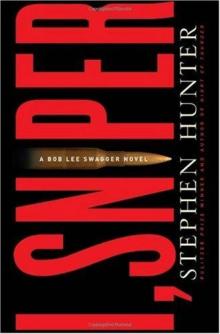 I, Sniper
I, Sniper Havana
Havana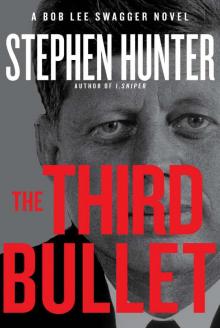 The Third Bullet
The Third Bullet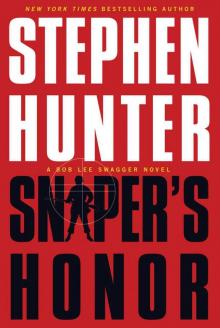 Sniper's Honor: A Bob Lee Swagger Novel
Sniper's Honor: A Bob Lee Swagger Novel Dirty White Boys
Dirty White Boys The 47th Samurai
The 47th Samurai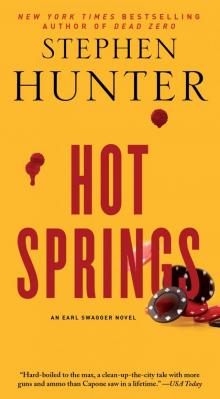 Hot Springs
Hot Springs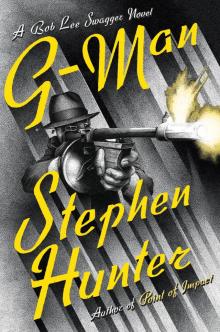 G-Man
G-Man Black Light
Black Light Time to Hunt
Time to Hunt The Day Before Midnight
The Day Before Midnight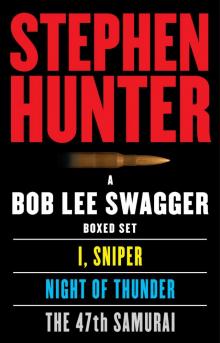 A Bob Lee Swagger Boxed Set
A Bob Lee Swagger Boxed Set The Master Sniper
The Master Sniper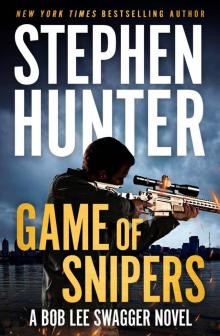 Game of Snipers
Game of Snipers Tapestry of Spies
Tapestry of Spies Citadel
Citadel The Second Saladin
The Second Saladin Stephen Longacre's Greatest Match
Stephen Longacre's Greatest Match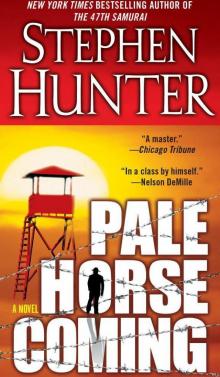 Pale Horse Coming
Pale Horse Coming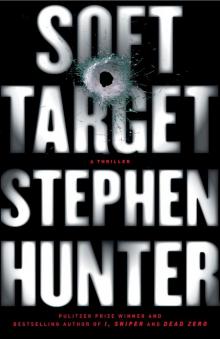 Soft Target
Soft Target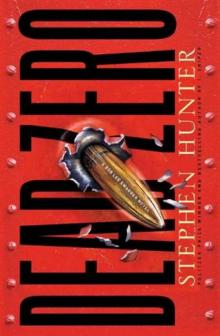 Dead Zero
Dead Zero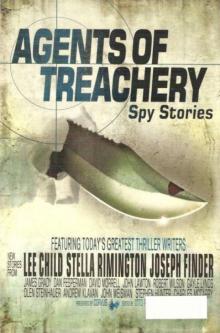 Casey at the Bat
Casey at the Bat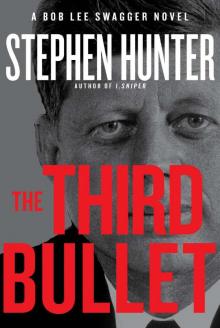 The Third Bullet bls-8
The Third Bullet bls-8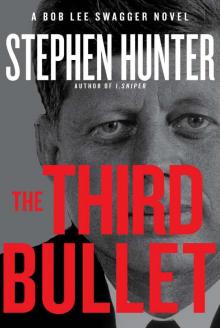 The Third Bullet: A Bob Lee Swagger Novel
The Third Bullet: A Bob Lee Swagger Novel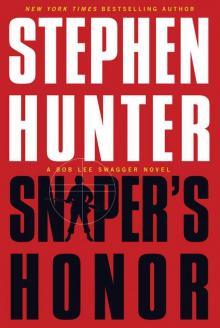 Sniper's Honor
Sniper's Honor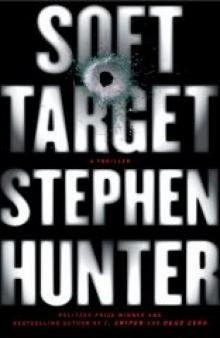 Soft target rc-1
Soft target rc-1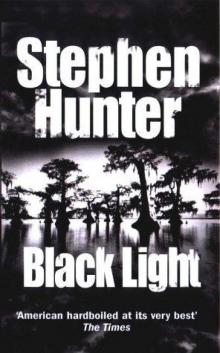 Black Light bls-2
Black Light bls-2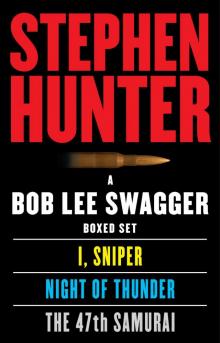 A Bob Lee Swagger eBook Boxed Set: I, Sniper, Night of Thunder, 47th Samurai
A Bob Lee Swagger eBook Boxed Set: I, Sniper, Night of Thunder, 47th Samurai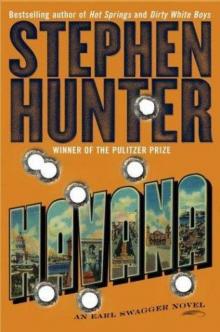 Havana es-3
Havana es-3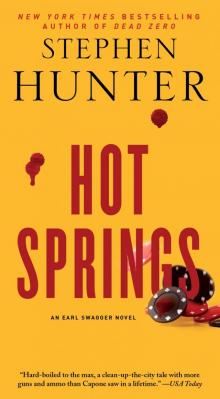 Hot Springs (Earl Swagger)
Hot Springs (Earl Swagger)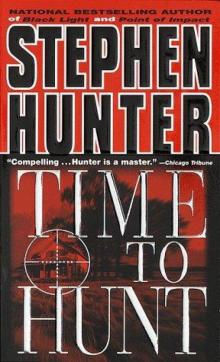 Time to Hunt bls-1
Time to Hunt bls-1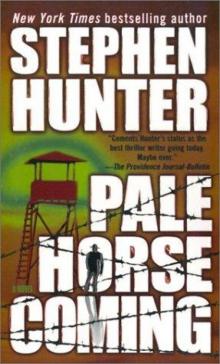 Pale Horse Coming es-2
Pale Horse Coming es-2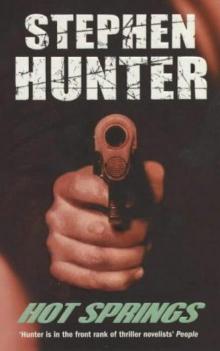 Hot Springs es-1
Hot Springs es-1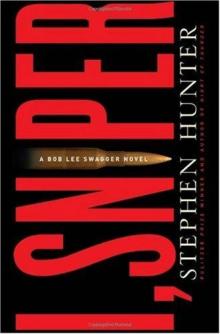 I, Sniper: A Bob Lee Swagger Novel
I, Sniper: A Bob Lee Swagger Novel